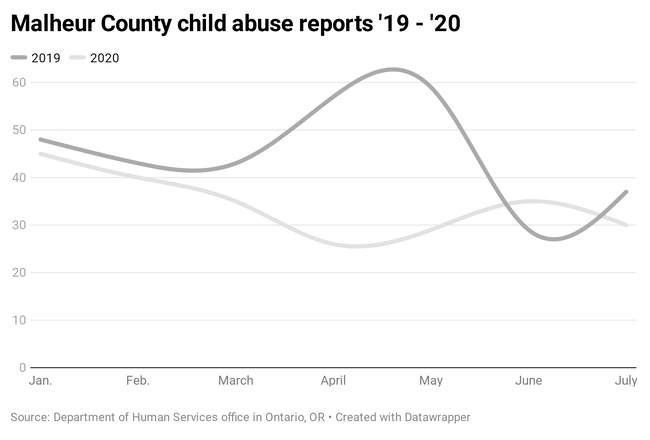 In April and May, the child welfare office of the state Department of Human Services initiated about half the number of child protective services investigations it had during that period last year in Malheur County.
In April and May, the child welfare office of the state Department of Human Services initiated about half the number of child protective services investigations it had during that period last year in Malheur County.
ONTARIO – When the Covid pandemic forced schools to close in the spring, the state’s child welfare office in Malheur County saw a drop in child abuse reports.
Such investigations are assigned based on screenings of calls to the child abuse hotline, mostly from mandatory reporters – workers, including teachers, counselors, coaches and pediatricians, who are legally required to “make reports if they have reasonable cause to suspect abuse or neglect,” according to the state Department of Human Services.
The department said the decline during the pandemic is likely due to children being at home, and not under the watchful eye of school staff.
School staff were the number one reporters of child abuse last year, but the figures are not trending that way for 2020, said Sunny Petit, a DHS spokesperson. Law enforcement are currently the top reporters, with DHS staff being second and school staff third.
The number of reports the department’s Ontario office received and assigned in 2019 and 2020, respectively, were 48 and 45 in January, 43 and 40 in February, and 43 and 35 in March, the latter being when most schools closed mid-month due to Covid.
The most significant drop-offs came in the two months that followed – 26 in April and 29 in May, which fell by about 50% from last year.
The numbers only dropped by six in June and seven in July compared to 2019, but the summer “generally has a lower number of calls coming in as more children are out of school,” said Petit.
In total, the number of child abuse and neglect reports between March and July were about 31% lower than last year.
Malheur County District Attorney Dave Goldthorpe said the majority of child abuse reports come from mandatory reporters who interact with children “within their daily routine.”
Given its timing, the decline in reports didn’t surprise Mark Redmond, Malheur Education Service District superintendent.
“When kids aren’t in school, there’s just that many more mandatory reporters that aren’t out there,” said Redmond.
“Anytime you see a reduction in child abuse cases, you have to wonder why that reduction’s there,” he said. “When we have kids not in school talking to counselors and administrators, you have to wonder if there are kids out there that are getting missed.”
Redmond said one reason many educators are pushing to return to school in person is “a concern about us making sure some of those most vulnerable kids get what they need.”
Warning signs of abuse are difficult to recognize at a distance when children are not in schools, said Jennifer Suzuki, ESD student wellness coordinator.
“You see a bruise around their wrist or something on their face, and you really can’t notice those things over Zoom,” said Suzuki. For teachers, she said, having close enough relationships with students to recognize changes in their behavior is pivotal to reporting abuse.
“A lot of times, kids go up to teachers in the hall or before school or after school to have those conversations, and there are just not opportunities to do that,” she said. “I know this coming school year as we try to do distance learning, there will be a lot of emphasis on developing those relationships.”
Regarding the drop in child abuse reports, Suzuki said, “I think we need to address it every year. This particular situation, it’s during this school year, but I would really like, as a community, to start addressing it for June and July.”
She said she was impressed with the efforts local schools were taking even prior to the pandemic to better address suspected abuse and to teach emotional health to students.
“Schools are really at the point where they know they need to put more attention on those,” she said. “I think it’s really gonna benefit our students and I do think it’s going to help with the reporting rates.”
Darren Johnson, Nyssa School District superintendent, said, “I am very concerned that children being educated via distance learning at home will not have all the support that normal school provides: contact with multiple supportive adults, contact with friends, consistent meals, etc.”
Johnson said the school district has “not received much guidance” on navigating these circumstances, but it provides yearly training to educators “of what to look for in cases of child abuse and neglect.”
“With online learning, it will be more difficult to see if children are having problems, but we have planned for teachers and instructional assistants to make contact with students multiple times each week regarding education support, and hopefully those contacts will make a difference for students in having someone to talk to if they are in need,” said Johnson. “We continue to employ mental health counselors at each school (elementary, middle, high) who can and will reach out to individual students when notified.”
Corina Perez, education coordinator at Giggles & Grace Early Learning Center in Ontario, said she is a member of Gov. Kate Brown’s Healthy Early Learners Council and the topic of child abuse and neglect “is brought up every meeting.”
“That is something all educators worry about,” said Perez.
When Giggles & Grace was fully operating its two sites, it would conduct daily health checks, “which allowed us to document any changes in the child,” she said. “Now with Covid we are unable to do that.”
Keeping close communication with parents weekly, providing emergency care services and making “personal home deliveries” to families “is one way we can make some observations,” said Perez.
For its Early Head Start program, Giggles & Grace has a family advocate, as well teachers who reach out to parents weekly and deliver packets to their home.
“Although this is nowhere near our daily health checks it at least gives us some idea of how the children are doing,” said Perez.
Giggles & Grace’s staff take about 30 hours of training child abuse, neglect and trauma-informed care training each year.
Wendy Hill, district director for the DHS Ontario office, said that as a result of Covid, “Mandatory reporters were not seeing children, and pediatricians weren’t seeing them as much because parents weren’t going into doctors’ offices as much.”
The drop-off in reports concerned staff at DHS, she said, and state workers have continued to prioritize in-person home visits with additional visits over Zoom or Skype if needed.
Pat Stephens, program manager at Treasure Valley Children’s Relief Nursery, said the pandemic “completely changed” the way the nursery provides services for children at risk of abuse “because we couldn’t have the kids in the classroom and we couldn’t do home visits,” and it used donations to buy computers for families who needed them.
“Let’s face it,” she said, “in the best of times, there are issues. But right, now it’s just unbelievably stressful times for everyone, and I do worry about children not being seen.”
Stephens expressed concerns about how financial strains resulting from the pandemic could put children at risk.
“It really puts people in a bind, and so if you have mental health issues,” she said,” it’s just really going to increase the possibilities.”
“We encourage members of the community and family members to check in, when they can do so safely, with families,” said Petit. “We do know that risk factors for everyone are elevated during this global pandemic, which is why ODHS as an organization is doing what we can to help families who are in, or might be near, crisis.”
The Child Abuse Hotline is a toll-free number that receives calls all day and every day of the year. Report child abuse by calling 1-855-503-SAFE (7233)
PRIOR REPORTING:
Project DOVE sees uptick in calls for domestic violence services
Local welfare officials see domino effect toppling Malheur County families, leaving kids in poverty
News tip? Contact reporter Ardeshir Tabrizian by email at [email protected] or call 503-929-3053.
WE COUNT ON YOU: Reader support allows the Enterprise to provide in-depth, accurate reporting that otherwise would not get done. Keeping the community well informed is essential. SUBSCRIBE – $5 a month, automatically. DONATE – to provide additional support.




